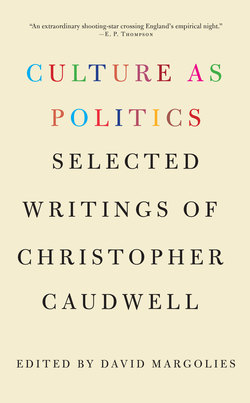Culture as Politics

Реклама. ООО «ЛитРес», ИНН: 7719571260.
Оглавление
Christopher Caudwell. Culture as Politics
Отрывок из книги
Culture as Politics
Selected Writings of Christopher Caudwell
.....
The change of Caudwell’s use of ‘illusion’ can be better understood in reference to the change of value he attaches to ‘bourgeois’. When he explains the functioning of poetry in a pre-industrial context, ‘illusion’ is a vision, a fantasy, something that is not a material reality. He uses it as a quasi-technical neutral term that has to do with the mental state accompanying the tribal, pre-industrial poetry-music-dance experience – a hyper-reality. However, when he moves to his own period, the focus switches from the form to the content; i.e., ‘illusion’ is still a vision but now what it envisions is false. Thus it acquires a negative meaning – ‘illusory’. It is still immaterial and fantasy but misleading – more ‘delusion’ than simply ‘illusion’. This confusion led the German translator of Illusion and Reality to add Bürgerliche (bourgeois) to ‘illusion’ in the title. This misses Caudwell’s point, of course, that the poetic illusion has a general function – it is not tied to bourgeois consciousness – it can be a vision that helps to create the consciousness and unity that not only offers a picture of reality which is shared and common, but helps to make it deliverable. It helps to realise – i.e., make real – the ‘reality’ in the vision. It is that process of an emotionally charged vision directed toward reality that he sees as the general function of poetry. Two other terms might create some confusion – ‘dialectics’ and ‘determined’. ‘Dialectics’ has become mystified, a term with magic resonance but with unclear application. Caudwell uses dialectics to convey studying things in movement and in context. Motion or change is the natural state of things and in actual life there is always context. Dialectics sees the interaction of things that are bound together in such a way that a change in one of the elements necessarily involves change or re-positioning in the other elements and therefore in fact in the whole configuration. At the simplest level, in the abstract, dialectics concerns the relation between front and back, or inside and outside, etc. When the subject involves humans, instead of an abstraction, the variables will be greater and the matter therefore significantly more complex. And if there is a macro-scale subject (society or the economic system), the variables are massively increased, are less stable, change at different speeds and move in different directions. The whole becomes extremely complex. This is why economic forecasting, for example, is considered to have so little chance of being accurate in a real world. But there is in popular media a habit of abstraction, of reducing the number of real factors or freezing their movement into a snapshot. This simplification is a falsification. The real world is in constant change – and this is what dialectics addresses.
Caudwell showed a dialectical turn of mind long before he came to Marxism. His invention of an automatic gear based on a moving fulcrum illustrates this. Most people probably learned something about the theory of fulcrums in primary school maths or science and, at a practical level, understood fulcrums through, for example, the see-saw. In regard to the see-saw, the problem of balance is not complex because there are few components and also because the fulcrum does not move and thus the only variables are the weights and the distance from the fulcrum. However, it is easy to imagine that, if the fulcrum were moving, the problem would be complex. Seeing dialectics in material terms does not make it less complex but it removes the mysticism.
.....